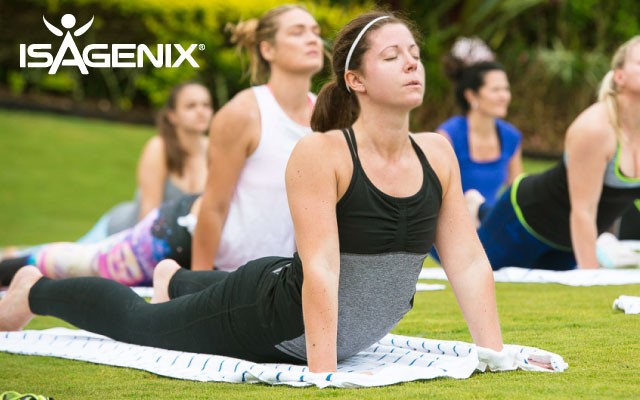Workout regimens come and go as fads, changing in popularity every year. The ancient practice of yoga, however, is just as popular now as it was years ago. The benefits of yoga reach far beyond improving flexibility and can significantly improve performance for the better.
A growing number of professional and college-level athletes have turned to yoga and have celebrated it for its benefits. Here we outline six reasons why athletes should give yoga a try.
1. Yoga improves athletic balance and flexibility.
Enhanced flexibility and balance have obvious importance in yoga. But they are an aspect of performance in several sports that often goes overlooked and is undervalued. Research has shown that the introduction of a program that focuses on balance and flexibility improves many performance measures, including range of motion (1, 2).
2. Yoga helps athletes adapt to stress.
Any form of exercise can act as a stress reliever. But yoga appears to help reduce stress and helps the body adapt to stress long after a workout (3). One study on young cyclists following a rigorous training regimen concluded that incorporating a regular yoga module into their routine helped keep the athletes both mentally and physically fit (4).
3. Yoga can strengthen the immune system.
In older athletes, yoga is shown to help maintain immune function with age (5). Regular yoga practice also helps improve antioxidant defense systems in the body, even when the body is under the uniquely stressful training conditions (6).
4. Yoga can decrease muscle soreness.
When yoga is added to a strenuous training regimen, studies show it can help lessen delayed-onset muscle soreness (7, 8). The reason may be that yoga helps decrease blood lactate levels of athletes at rest (9). Sounds like a benefit that would benefit not only athletes, but anyone who exercises and prefers to be free of the pain of muscle soreness.
5. Yoga can better decision making and memory.
Most brain health research centers around active older adults. However, there’s enough evidence in yoga to suggest that the practice is also a good idea for athletes interested in better decision making and memory (10). In fact, one study showed that yoga was superior in improving connections in the brain related to mental performance (11).
6. Yoga helps keep athletes injury free.
The most compelling reason for athletes to take up yoga is that it can help prevent injuries. Studies have shown incorporating yoga as a supplemental activity to a high-volume exercise regimen is an effective strategy to support injury prevention (1, 4, 7, 12).
More flexibility, better performance, and staying injury free – these are the main reasons why strength and conditioning coaches are encouraging more athletes to take up yoga. Scientific research supports yoga’s place in any workout regimen.
References
- Hrysomallis C. Balance ability and athletic performance. Sports Med. 2011 Mar 1;41(3):221-32. doi: 10.2165/11538560-000000000-00000.
- Polsgrove MJ, Eggleston BM, Lockyer RJ. Impact of 10-weeks of yoga practice on flexibility and balance of college athletes. Int J Yoga. 2016 Jan-Jun;9(1):27-34. doi: 10.4103/0973-6131.171710.
- Lin SL, Huang CY, Shiu SP, Yeh SH. Effects of Yoga on Stress, Stress Adaption, and Heart Rate Variability Among Mental Health Professionals–A Randomized Controlled Trial. Worldviews Evid Based Nurs. 2015 Aug;12(4):236-45. doi: 10.1111/wvn.12097. Epub 2015 Jul 28.
- Patil SG, Mullur LM, Khodnapur JP, Dhanakshirur GB, Aithala MR. Effect of yoga on short-term heart rate variability measure as a stress index in subjunior cyclists: a pilot study. Indian J Physiol Pharmacol. 2013 Apr-Jun;57(2):153-8.
- Eda N, Shimizu K, Suzuki S, Tanabe Y, Lee E, Akama T. Effects of yoga exercise on salivary beta-defensin 2. Eur J Appl Physiol. 2013 Oct;113(10):2621-7. doi: 10.1007/s00421-013-2703-y. Epub 2013 Aug 8.
- Sinha S, Singh SN, Monga YP, Ray US. Improvement of glutathione and total antioxidant status with yoga. J Altern Complement Med. 2007 Dec;13(10):1085-90. doi: 10.1089/acm.2007.0567.
- Brunelle JF, Blais-Coutu S, Gouadec K, Bédard É, Fait P. Influences of a yoga intervention on the postural skills of the Italian short track speed skating team. Open Access J Sports Med. 2015 Feb 12;6:23-35. doi: 10.2147/OAJSM.S68337. eCollection 2015.
- Boyle CA, Sayers SP, Jensen BE, Headley SA, Manos TM. The effects of yoga training and a single bout of yoga on delayed onset muscle soreness in the lower extremity. J Strength Cond Res. 2004 Nov;18(4):723-9.
- Raju PS, Madhavi S, Prasad KV, Reddy MV, Reddy ME, Sahay BK, Murthy KJ. Comparison of effects of yoga & physical exercise in athletes. Indian J Med Res. 1994 Aug;100:81-6.
- Gothe NP, McAuley E. Yoga and Cognition: A Meta-Analysis of Chronic and Acute Effects. Psychosomatic Medicine: September 2015 – Volume 77 – Issue 7 – p 784–797 doi: 10.1097/PSY.0000000000000218
- Eyre HA, Acevedo B, Yang H, Siddarth P, Van Dyk K, Ercoli L, Leaver AM, Cyr NS, Narr K, Baune BT, Khalsa DS, Lavretsky H. Changes in Neural Connectivity and Memory Following a Yoga Intervention for Older Adults: A Pilot Study. J Alzheimers Dis. 2016;52(2):673-84. doi: 10.3233/JAD-150653.
- Crews, Leigh. Injury prevention: yoga. IDEA Fitness Journal, Feb. 2006, p. 77+.





